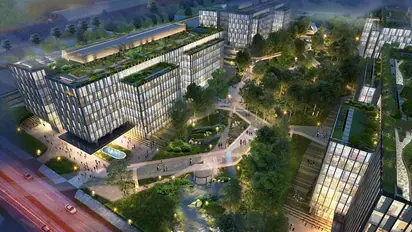Bengaluru: BACL to open business park at Airport city; Over 3.5 lakh jobs to be created

Synopsis
Bangalore Airport City Limited (BACL) is developing a 2 million square feet "Business Park" at Kempegowda International Airport, aiming to create 3.5 lakh jobs and contribute $50 billion to Bengaluru's economy. The project emphasizes sustainability, innovation, and connectivity, positioning Bengaluru as a global GCC hub.
Bengaluru Airport City Limited (BACL), a subsidiary of Bengaluru International Airport Limited (BIAL), has initiated the ambitious "Business Park" project by acquiring 2 million square feet of land. This development aims to position Bengaluru as a global hub in the Global Capacity Center (GCC) sector, generating around 3.5 lakh jobs and contributing $50 billion to the economy.
The Business Park is part of Bangalore Airport City, located within the Kempegowda International Airport (BLR Airport) premises. The city is being developed as a mixed-use destination featuring business parks, educational and healthcare centres, research and development (R&D) hubs, and various entertainment and hospitality facilities. The vision for Bangalore Airport City is to become a sustainable, smart, and world-class urban hub.
'Bengalureans can soon reach cantonment station from Airport in 40 mins': Railway Minister Ashwini Vaishnav
The Business Park will span 17.7 acres and include four blocks, each covering 0.5 million square feet. A key feature of the park is its biophilic design, incorporating urban forests, lush gardens, and green balconies to create an attractive environment for business activities.
Rao Munukutla, Executive Director and CEO of BACL emphasized Bengaluru's rising status as the GCC capital of the world, particularly in sectors like Information Technology, Biotechnology, Automotive, and Aerospace. He noted that Bengaluru is home to 36% of India’s Global Competence Centers (GCCs). Munukutla further highlighted that the 2 million square feet business park will offer numerous networking opportunities, advanced infrastructure, and world-class amenities.
"Our project aligns perfectly with Karnataka's GCC policy, aiming to make Bengaluru a global business hub. Over 52% of the airport city's development will be dedicated to business parks, fostering innovation and collaboration," he added.
'Manyata Tech Falls': Video of rain wreaking havoc in Bengaluru's iconic tech park stuns internet (WATCH)
One of the standout features of the project is its close proximity to the upcoming Airport West Metro station, which will provide swift and eco-friendly connectivity to Bengaluru's city centre. This is expected to significantly enhance accessibility for both employees and visitors.
Bangalore Airport City is also being designed as a high-tech hub, with plans for 3D printing institutes, advanced technology centres, and central kitchens. In addition, entertainment and hospitality destinations are set to flourish, with the city set to host India's first concert arena, along with convention and exhibition centres. The area will also offer 5,200 hotel rooms, with the Taj Bangalore already operational and a 775-room combo hotel (Vivanta & Ginger) under construction.
The city’s infrastructure is also built on sustainability principles, with the entire campus being energy-neutral and constructed using renewable resources. The project has earned the IGBC’s Green Cities Platinum certification, further bolstered by large-scale rainwater harvesting initiatives aimed at meeting the city's water needs in line with global sustainable development goals.
'Can we send rainwater back to sky?', HM G Parameshwar's remarks draw criticism as rainfall lashes Bengaluru
Additionally, the education and healthcare sectors in Bangalore Airport City are being developed on a large scale, with major international organizations setting up facilities like a Life Sciences Park. This park will support the state's healthcare and educational infrastructure. Moreover, institutions such as BIAL Academy and Air India Academy are preparing the next generation of aviation and hospitality professionals.
Bangalore Airport City exemplifies a forward-thinking approach to urban development, integrating sustainability, innovation, and connectivity. Positioned at the core of Bengaluru’s economic expansion, Kempegowda International Airport is one of the fastest-growing airports globally, handling 37.5 million passengers last year. Its capacity is expected to reach 90 million passengers by 2030. The city's skilled workforce, especially in aerospace, will further benefit industry leaders like Airbus and Boeing, cementing Bengaluru’s role as a major global business and manufacturing hub.
Stay updated with all the latest Business News, including market trends, Share Market News, stock updates, taxation, IPOs, banking, finance, real estate, savings, and investments. Track daily Gold Price changes, updates on DA Hike, and the latest developments on the 8th Pay Commission. Get in-depth analysis, expert opinions, and real-time updates to make informed financial decisions. Download the Asianet News Official App from the Android Play Store and iPhone App Store to stay ahead in business.